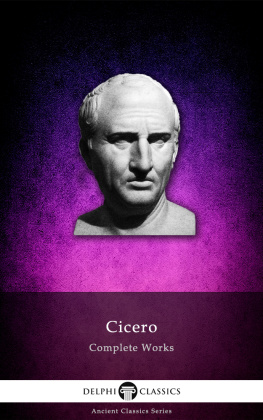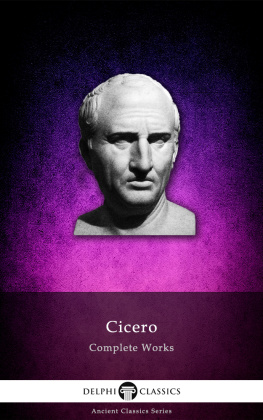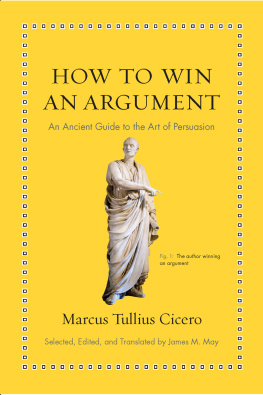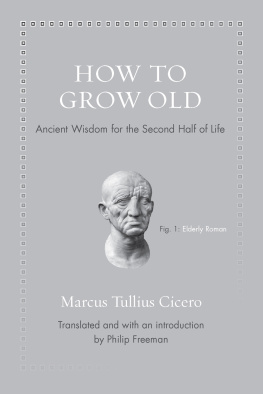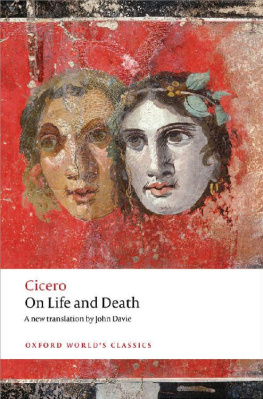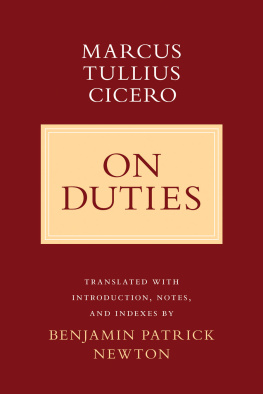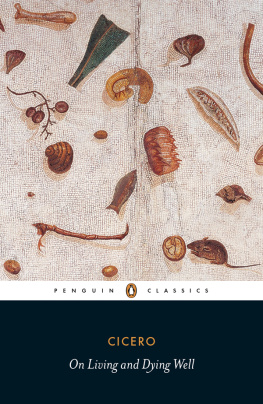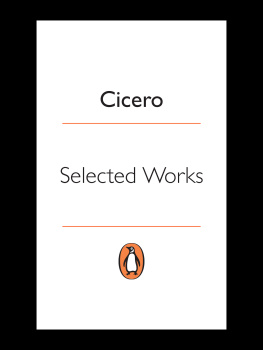On Fate, 13, 30.
On the Nature of the Gods, I, 23, 62.
Letters to Friends, XIV, 4, 1, Letters to Atticus, IV, 10. On this correspondence, see Cicero: Selected Works (ed. M. Grant, Penguin Books, revised edn 1971), pp. 58ff.
On the Nature of the Gods, I, 5, 10; cf. Tusculans, IV, 4, 7, On the Chief Good and Evil, I, 5, 15, 1, 8, 27 (De Finibus Bonorum et Malorum can perhaps be translated Different Views regarding the Chief Good and Evil).
Tusculans, I, 29, 70.
On Divination, II, 72, 148, etc.
On Laws, I, 7, 23.
Alexander Pope, Epilogue to the Satires, Dial. I, 734.
On Divination, I, 49, 110.
On Laws, I, 7, 22 (translated by C.W. Keyes).
On Laws, I, 10, 29.
On Duties, III, 5, 21, III, 6, 31, III, 6, 28 (see Cicero: Selected Works, op. cit.).
On Laws, I, 5, 16, I, 7, 23, I, 15, 42.
On the State, III, 22, 33.
On the State, I, 27, 43.
See Appendices I, II, III, pp. 356ff.
On this subject see Cicero: Selected Political Speeches (ed. M. Grant, Penguin Books, 1969), pp. 11ff.
Letters to Atticus, XII, 52, 3. Atticus had apparently commented on the problems of rendering Greek terms into Latin (p. 21). On the letters see Cicero: Selected Works, op. cit, pp. 58ff.
On Duties, III (the contents of which are largely original) and Cato the Elder: On Old Age are both translated in Cicero: Selected Works, op. cit., pp. 159., 213ff.
On Duties, II, 17, 60, III, 2, 7.
On Duties, I, 2, 6.
On Divination, II, 1, 1 and 5, II, 2, 5, Tusculans, II, 3, 6, On the Chief Good and Evil, I, 3, 7.
Letters to Friends, XI, 27, 5.
Letters to Friends, IV, 4 (September 45 BC ).
On Divination, II, 2, 7, For Murena, 30, 63.
Fragment 42 (Orelli).
Tusculans, II, 4, 11.
Tusculans, V, 2, 5.
Psalms, 84, 10.
For example in the speech For Archias. See Cicero: Selected Political Speeches, op. cit., pp. 147ff.
Plutarch, Cicero, 3.
Academics, II, 2, 5.
On the Chief Good and Evil, I, 3, 9.
On Duties, II, 1, 2, etc.
For these philosophers, see below, pp. 27, 28.
On the Chief Good and Evil, I, 1, 2.
On Lucretius, see below, p. 26.
On Duties, I, 6, 19.
Cicero in Lactantius, Divine Institutions, III, 14, 17.
On Divination, II, 1, 1.
Cicero, ed. T. A. Dorey, Routledge & Kegan Paul, 1964, p. 166.
See Cicero: Selected Works, op. cit., and Cicero: Selected Political Speeches, op. cit. He also wrote poetry (p. 79).
Letters to Atticus, XIII, 19, 4; cf. Letters to Friends, I, 9, 23. Heraclides Ponticus (c.390310 BC ), from Heraclea on the Black Sea, came to Athens and became the pupil of Speusippus and later of Plato. The Hellenistic popular dialogues of exposition, which may have served as more immediate models, are lost.
Letters to Atticus, XIII, 12, 3.
On the Nature of the Gods, I, 3, 8.
Academics, II, 6, 17; but see above, p. 13.
Academics, I, 6, 24.
Lucretius, On the Nature of the Universe, I, 139, I, 318ff., III, 261.
On the Chief Good and Evil, I, 3, 10, III, 2, 5, Tusculans, II, 15, 35, III, 5, 10.
On Duties, I, 2, 6.
Tusculans, V, 11, 33.
Fragment 114 (G. S. Kirk, J. E. Raven, M. Schofield, The Presocratic Philosophers, Cambridge University Press, 2nd edn, 1983, p. 211 no. 250).
Tusculans, V, 4, 10; cf. Academics, I, 1, 3, I, 4, 15.
Letters to Atticus, II, 3, 3.
Wellbeing or welfare is sometimes preferred as a translation: cf. H. Sidgwick, History of Ethics, Macmillan, 6th edn, reprinted 1967, pp. 48 n. 1, 56 n. 2.
Plutarch, Cicero, 2: by character he was a Platonic lover of learning and wisdom.
On the State, II, 11, 21; cf. I, 22, 36.
On Duties, I, 1, 2.
This doctrine went back to Aristippus, founder of the Cyrenaic school, grandson of a companion of Socrates of the same name. For difficulties of terminology, see above, p. 23n.
Letters to his brother Quintus, II, 9, 3.
Tusculans, III, 21, 50.
It was foreshadowed by Plato, Philebus, 30, etc.
e.g. Cleanthess Hymn to Zeus.
This had been stressed by Diogenes of Sinope (c.400325 BC ), founder of the Cynic school, who urged the renunciation of all material possessions.
For the third volume see Cicero: Selected Works, op. cit., pp. 159ff.
Though the point was not philosophically worked out (p. 13).
Letters to Atticus, XVI, 11, 4.
Seneca, Letters, 90, 7.
The first Academics after Plato had concentrated on mathematics.
This had been the belief of Pyrrho of Elis (c.360270 BC ), founder of the Sceptical school. Isocrates too (436338 bc), claiming to adopt a Socratic attitude, had believed that absolute knowledge is impossible (Busiris, 24).
i.e. Academics, I, as it has come down to us; Academics, II (the Lucullus), forms part of the first edition (which was written in two volumes, subsequently expanded to four). Cicero is prepared to allow the speakers in his dialogues to accuse the Academy of introducing confusion, On the Laws, I, 13, 39. H.J. Blackham, (Objections to Humanism, Penguin Books, 1965, p. 11) restates Ciceros preference for the probable.
Academics, I, 4, 13.
Academics, II, 43, 132.
Tusculans, V, 41, 120.
Plutarch, Cicero, 4.
For the influence of his speeches see Cicero: Selected Works, op. cit., pp. 24ff. Here I have expanded the information about his philosophical treatises.
For his style, ibid., pp. 20ff.
Pliny the elder, Natural History, VII, 31.
Virgil, Aeneid, VI, 703ff.
cf. Seneca the elder, Suasoriae, VI, 1, 22, 24, 26.
Seneca the younger, Moral Letters, 40, 11; 114, 16.
Institutio Oratorio, X, 1, 123.
Scriptores Historiae Augustae, Severus Alexander, 30, 2.
Divine Institutions, I, 17, 3, I, 15, 6, III, 14, 10.
Letters, XXII, 30.
Confessions, III, 4, 7, VIII, 7, 17.
The Carolingian Paschasius Radbertus converted the active leisure of On Duties to the monastic ideal. Sedulius Scottus knew many of the treatises. Einhard quotes the Tusculans in the preface of his Life of Charlemagne, and manuscripts of it (and On the Orator) were acquired in the ninth century by Servatus Lupus of Ferrires. The Presbyter Hadoardus of the Western Franks quotes extensively from the same work, and in the eleventh century Meinhard of Bamberg reported it as valuable training for Christian philosophy.
On Invention (on which see also p. 233) and another textbook To Herennius, which was wrongly attributed to Cicero, far exceeded the more mature rhetorical works in popularity.
Herbord of Michelsberg (d. 1168) quoted whole chapters of On Duties, and then Alexander of Neckham recommended a curriculum including this and five other treatises of Cicero.
On Duties was used by the Paris Arts Faculty in the mid thirteenth century as its guide to social ethics, Aristotles Ethics being employed for the study of the inner life.
Convivio, II, 13.
His prose style was mainly inspired by Ciceros philosophical treatises and Senecas
Next page

